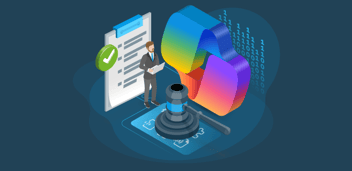The second wave of Microsoft Copilot announcements in late 2024 brought a game-changing capability: the Copilot Agent Builder. Powered by Copilot Studio, this feature dramatically simplifies how business users can create AI agents to automate and execute business processes on their behalf. It represents a powerful fusion of the conversational intelligence in Microsoft 365 Copilot with the customizable, action-oriented capabilities of Copilot Studio.
This shift empowers your teams to move beyond simple Q&A and build specialized AI assistants that actively work for them. But with this great power comes a critical need for oversight. In this blog post, we will explore how Microsoft’s new Agent Builder simplifies the creation of Copilot AI agents (also known as custom copilots) and how Rencore Governance provides the essential guardrails to manage these powerful tools effectively and securely.

What are Copilot Agents?
Think of the standard Microsoft 365 Copilot as a brilliant generalist, an assistant that can summarize meetings, draft emails, and analyze data across your M365 apps. Copilot AI agents, on the other hand, are specialists. They are custom, AI-driven assistants you design to perform specific, often complex, multi-step business processes. They make daily tasks easier, more consistent, and vastly more efficient.
With the introduction of the Copilot Agent Builder, creating these custom agents is no longer the exclusive domain of developers. Business users can now create tailored assistants for their specific needs without writing a single line of code. These agents can, among many other things, be designed to:
- Onboard new employees: Guide them through HR processes, introduce them to key documents, and answer frequently asked questions.
- Manage IT support requests: Triage incoming tickets, provide instant solutions for common problems, and escalate complex issues to the right team.
- Facilitate sales enablement: Equip sales teams with the latest product specifications, competitive intelligence, and customer case studies on demand.
The key difference is a shift from passive assistance to active execution. These AI agents don't just find information. They perform tasks, orchestrate workflows, and drive business processes forward.
Creating custom copilots with Agent Builder
The true magic of the Agent Builder lies in its intuitive, conversational interface. It allows users of all technical skill levels to create a Copilot agent with just a few prompts. The barrier to entry has been effectively removed.
Example:
Imagine you want to develop an agent to help your field service team with on-site repairs. With Agent Builder, you can describe its purpose in plain language. No coding required. For example:
"Create a copilot to help our service technicians. It should be able to access our technical manual library in SharePoint to provide step-by-step repair instructions. It needs to connect to our inventory system to check for spare part availability and log a service report when the job is complete."
Agent Builder will then automatically scaffold your copilot based on this request. Here's how that breaks down:
- Purpose: Assist service technicians during on-site repairs.
- Skills needed:
- Answer technical questions using repair manuals.
- Check spare part availability in real time.
- Log completed repair reports into your system.
- Data connections:
- SharePoint (for technical manuals).
- Inventory database/system (for spare part status).
- Service report system (for logging job completions).
- Outcome: A task-focused Copilot AI agent that actively supports technicians from start to finish, reducing errors, improving turnaround, and standardizing service quality.
However, this ease of creation makes robust Microsoft Copilot governance more important than ever. When anyone can create an agent and connect it to data, you need a way to ensure it's done securely and responsibly. More on this later.
Benefits of Using Copilot Agents
The organizational advantages of deploying custom copilot AI agents are significant and extend far beyond simple convenience.
- Enhanced efficiency: By automating time-consuming and repetitive tasks, you free up your employees to focus on strategic, high-value work. This boosts productivity and reduces the cognitive load of manual process management.
- Scalability and agility: Custom agents are not static. They can be easily modified and scaled as your business needs evolve. A simple departmental agent can grow into a sophisticated, enterprise-wide solution without starting from scratch.
- Real-time assistance and knowledge sharing: Agents provide immediate, 24/7 support. This is invaluable for global teams, customer support functions, and any role that requires quick, accurate access to information. They act as a persistent, expert knowledge base, ensuring consistency and accuracy in every interaction.

Copilot AI cost: Pay-as-you-go vs. subscription model
Understanding the pricing of Microsoft Copilot Studio, the engine behind your custom agents, is critical for planning your AI strategy and justifying the investment. Microsoft offers two primary models, each suited to different organizational needs and maturity levels. To learn more about the foundational differences between Copilot for M365 and Copilot Studio, you can explore our detailed comparison.
Pay-as-you-go model: What it is, who it’s suitable for
The Copilot Studio pay-as-you-go model is based on consumption, specifically the number of "messages" your Copilot agents process. A message is a unit of interaction between a user and an AI agent, typically a prompt and its response, though more complex operations may consume multiple messages.
What it is: You are billed $0.01 per message, with no upfront commitment. Usage is tracked and billed monthly via an Azure subscription. This Copilot AI pricing model gives you maximum flexibility and cost control. No message packs are required.
Who it’s suitable for:
- Organizations starting their AI journey: If you're just beginning to explore the potential of custom agents, this model allows you to experiment and run proofs-of-concept (PoCs) without a significant upfront investment.
- Departmental or project-specific solutions: For building an Copilot agent for a single department or short-term use case, paying per message is often more cost-effective than a full subscription.
- Businesses with fluctuating demand: If your agent usage is seasonal or unpredictable (e.g., open enrollment, product launches), this model ensures you only pay for what you use.
The primary benefit is the low barrier to entry and financial flexibility. The tradeoff is that costs can become high and unpredictable if an agent gains rapid adoption or sees unexpectedly high usage.
Message pack subscription: What it is, who it’s suitable for
Microsoft also offers a subscription option under its Copilot Studio pricing model: a 25,000-message pack per tenant per month, currently priced at $200 USD. This is a tenant-level license, meaning all agents within your organization share the capacity.
What it is: You pay a fixed monthly fee for a preallocated message pool. If you exceed the included capacity, Microsoft requires you to either purchase additional message packs or use the pay-as-you-go model for overages. Unused messages do not roll over to the next month.
Who it’s suitable for:
- Enterprises with established AI strategies: If you plan to deploy multiple agents across various business units or have a high-volume, mission-critical agent, the monthly license offers better economies of scale.
- Organizations requiring budget predictability: The fixed monthly cost makes it easy for IT and finance leaders to budget for AI usage without worrying about unexpected spikes in consumption.
- Companies scaling successful pilots: If a pay-as-you-go agent proves its value and adoption increases, transitioning to a message pack subscription can help optimize costs and simplify billing.
This model is ideal for mature, scaled-up AI deployments where usage is consistent and high, making it easier for organizations to forecast and contain Copilot AI costs. It transforms AI from a variable operational expense into a predictable, long-term investment.
|
Criteria |
Pay‑as‑you‑go |
Message pack subscription |
|
Key features |
- $0.01 per message - No upfront cost - Billed via Azure |
- $200/month for 25,000 messages - Fixed monthly fee - Tenant-wide pool |
|
Best for |
- Pilot projects - Department-specific agents - Irregular or seasonal usage |
- Enterprise-wide deployments - Consistent, high-volume usage |
|
Pros |
✔︎ No upfront investment ✔︎ Maximum flexibility ✔︎ Ideal for experimentation |
✔︎ Predictable Copilot AI costs ✔︎ Better cost control at scale ✔︎ Simplified budgeting |
|
Cons |
✘ Costs can spike unexpectedly ✘ Difficult to forecast ✘ Billing requires Azure |
✘ Unused messages don’t roll over ✘ Less cost-effective at low usage |
The need for governance: Challenges of managing custom Copilot agents
While the ease of creating custom agents is a massive advantage for business agility, it simultaneously brings significant governance challenges. The democratization of AI development means that risks can be introduced from anywhere in the organization, often by well-meaning employees who are simply unaware of the implications. Organizations must ensure these powerful tools are used responsibly, securely, and in compliance with all internal and external regulations.
Key challenges include:
Control and compliance
Without central oversight, you risk the proliferation of "shadow AI." Who is building Copilot agents? Are they adhering to company branding, legal disclaimers, and data handling policies? How do you ensure an agent built by the marketing team doesn't inadvertently breach GDPR by connecting to an unapproved customer list?
Security and data protection
This is the paramount concern for most IT leaders. An AI agent is only as secure as the data it can access. If an employee creates an agent and connects it to a SharePoint site containing sensitive financial reports or PII, they may have unknowingly created a new vector for a data breach. Protecting sensitive data from unauthorized access via these new AI interfaces is critical.
Oversight and lifecycle management
How do you maintain a complete inventory of all custom agents across the tenant? What happens when the creator of a critical agent leaves the company? This leads to orphaned agents that are unmanaged, unpatched, and a potential security risk. Unchecked creation leads to agent sprawl, making it impossible to manage costs, identify redundancies, or ensure quality. The risk of AI agents being deployed outside of standard IT controls adds another layer of complexity for developer-centric teams.
How Rencore Governance keeps Copilot agents under control
At Rencore, we believe governance should be an enabler, not a blocker. It should give you the confidence to embrace innovation securely. We have launched our Copilot Studio Governance solution to meet real-world market needs and support organizations at every stage of their custom AI journey. Below is a look at how our solution helps address the key challenges of managing custom Copilot AI agents at scale—securely, efficiently, and with full compliance.
Comprehensive insights and reporting
The first step to control is complete visibility. Rencore Governance provides a single pane of glass with detailed insights into the usage of Copilot Studio, the power behind the Agent Builder. Our dashboards allow you to monitor:
- Who is creating custom agents.
- What data sources and connectors they are using.
- When they were created and last modified.
- How they are being shared (e.g., with everyone, with specific teams).
This 360° visibility is the foundation for maintaining security, ensuring compliance, and understanding the true scope of AI adoption within your organization.
Prebuilt Policies for Compliance
Visibility is essential, but automation is what makes governance scalable. Rencore’s powerful policy engine comes with prebuilt policies designed specifically for the risks associated with custom agents. These policies continuously scan your environment for potential issues, such as:
- Publicly shared agents: Automatically detect any custom Copilot agent that is shared with "Everyone," which could expose internal processes or data to the entire organization or even publicly.
- Unapproved connectors: Flag any agent using connectors that violate your data security policies, such as connecting to non-sanctioned third-party cloud storage or social media platforms.
- Sensitive data access: Identify agents that are configured with data sources pointing to sensitive locations, like SharePoint sites tagged as "Confidential" or containing financial data.
By automating the enforcement of these rules, you can ensure that sensitive information is protected while still allowing your teams to leverage AI effectively and innovate with confidence.

Streamlining Operations with Rencore Governance
Effective governance goes beyond just finding problems. It helps you manage the entire lifecycle of your AI assets efficiently.
Lifecycle management of custom Copilot agents
With Rencore Governance, organizations can automate the lifecycle management of their custom agents. Our policies can identify stale or orphaned agents, for example, an agent that hasn't been used in 90 days or whose owner is no longer with the company. You can then trigger automated workflows to notify a manager for review, archive the agent, or delete it, thus reducing clutter, minimizing security risks, and enhancing operational efficiency.

Enhancing Security and Compliance
By automating governance processes, Rencore helps organizations minimize human error and maintain a consistent state of compliance. For example, when our platform detects an agent that violates a policy (like being made public), it can do more than just send an alert. It can automatically trigger a remediation workflow:
- Notify the agent's owner and their manager via Teams or email.
- Provide them with context-aware guidance on why it's a risk.
- Create a ticket in your ITSM system (e.g., ServiceNow) to track the issue to resolution.
This level of automation ensures that unwanted risks are resolved quickly and correctly, helping you achieve audit-readiness and a more secure AI posture.
![Automate the resolution of Copilot agents without authentication with Rencore Governance]](https://rencore.com/hs-fs/hubfs/Custom_Copilots_without_Authentication_NEW%201.png?width=700&height=645&name=Custom_Copilots_without_Authentication_NEW%201.png)
In summary: How to build Copilot AI agents cost-effectively and securely
The combination of Microsoft’s Agent Builder for creating custom Copilot AI agents and Rencore Governance for managing them creates a uniquely powerful solution. It allows organizations to fully embrace the productivity gains of bespoke AI while ensuring robust compliance and security. By empowering your users to build tailored AI tools within a framework of strong, automated governance, you can unlock the full potential of these transformative tools without introducing unacceptable risk.
For any organization considering the adoption of custom AI agents, exploring a dedicated governance solution like Rencore Governance is not just a best practice. It's an essential step for ensuring effective, secure, and cost-efficient management.
Over to you
Are you exploring how to manage the lifecycle, risk, and cost of custom copilots in your organization?
Our Copilot Studio Governance solution is now available and ready to help you gain control without slowing innovation. Whether you're just getting started or scaling adoption, we’d love to show you how it works in practice and how other organizations are using it today.






